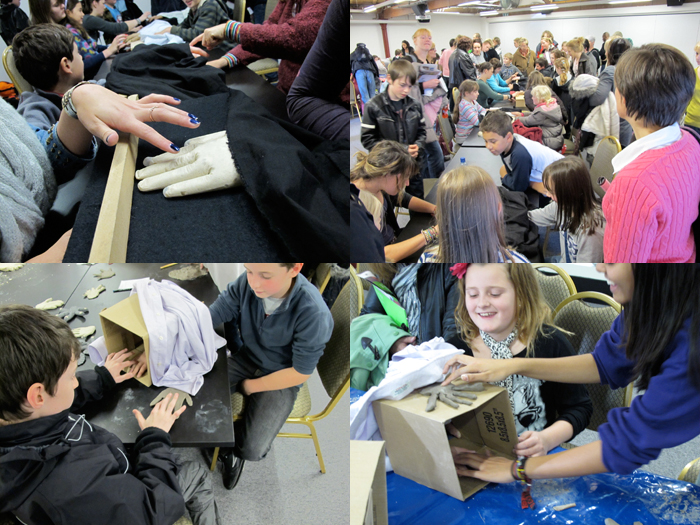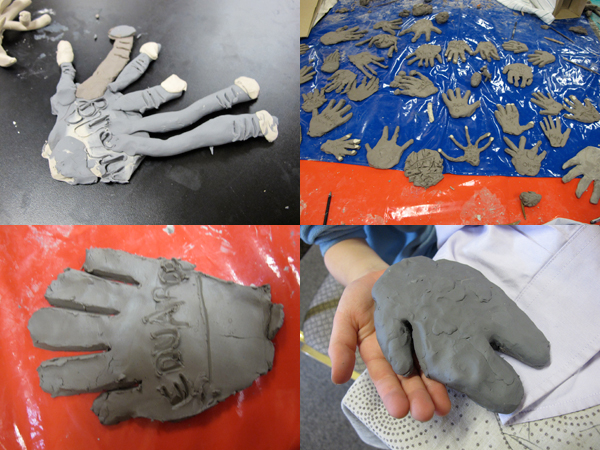Rubber Hand Illusion Experiment variations
“psychologists in Pennsylvania discovered an amazing illusion. They found that they could convince people that a rubber hand was their own by putting it on a table in front of them while stroking it in the same way as their real hand. The now-famous "rubber hand illusion" was not only a mind-blowing party trick, it was also hugely important in understanding how sight, touch and "proprioception" - the sense of body position - combine to create a convincing feeling of body ownership, one of the foundations of self-consciousness (Nature, vol 391, p 756)”
In this version we will explore a variation developed through trying this workshop on a large number of people, and not having funding to get loads of rubber hands. So we made the hands in the workshop with clay and used gloves full of different materials, sand gel, lentils, etc. But is it possible this could have an effect on the experiment its self?
Image: Working with psychologist Lizzie Lewis during Manchester Science Festival, Experimenting on mass with all age groups.
Materials
- False hands wooden or latex gloves to make fillable false hands.
- Clay [Approximately 1kg per hand]
- 2 paintbrushes or improvise 2 sticks/pencils or fingers to prod and stroke with
- A2 Cardboard to create improvised screen
Method
Demonstrate this using glove or realistic false rubber if available. Otherwise Rubber gloves can be filled with different materials for the experiment. [When demonstrating for the first time, do not explain what will happen fully to the participant]
1/ Place hand on table. Place false hand in place of the real hand and conceal the real hand so the participant cant see it, but so you are able to access it.
2/ Ensure you are both in a comfortable position as it can sometimes take a long time for he experiment to work.
3/ Ask the participant to concentrate on the false hand.
4/ Begin the tactile stimulation routine, tapping or stroking the hands in synchronisation, moving over the hand rhythmically. Form knuckles to fingertips repeating the pattern and making it up as you go.
5/ Talk to the test subject – ask them how the hand feels, any changes or sensations?
6/ To test if ownership has shifted to the false hand, change the tapping sequence from synchronous to asynchronous. Tap the false hand and don’t tap the real hand – their hand will suddenly feel numb, if the experiment is working. 7/ Once ownership has shifted to the false hand its quite mind blowing. Now you can start to experiment further. Make a Clay hand.
Image: As you can see the hand does not need to be true to life. Some hands were made purposefully alien for experiments.
We found that participants were more likely to connect with a hand that the hand made themselves than someone else’s or the other rubber gloves. And that textures can create unusual sensations.
Additionally we found that you can also remove a finger of the clay hand while maintain the tactile stimulation routine, and move it away from the hand and reposition in.
Suggestions to try: Squashing and reshaping the hand, making holes in the hand. Rejoining parts of the hand into different places.
This experiment does not work with everyone so don't be disappointed if it does not work for you. It took me ages to feel a transfer to the false hand. Its a bit like those magic eye images - once you do it once its easier the next time. But as a guess I would say it seems to work with 80% of people very effectively.

